Will a 1000 Calorie Diet Work
The 1000 Calorie Diet – Good, Bad or Indifferent?
In life there are all kinds of accepted 'truths' which are factually incorrect. Fitness and nutrition is full of them… 'don't eat carbs after 6', 'don't arch your back when deadlifting', 'stretch before exercise' etc etc. Most of these 'rules' turn out not to be true when put to the test, but they still persist in many quarters.
There's another one recently that I wanted to test in nutrition, which was 'don't under-eat or you'll lose your muscle'. I wanted to eat a 1000 calorie diet to see what the effects would be.
This one is particularly interesting to me, for a number of reasons…
- It contradicts a lot of the research around fasting.
- All diets are a form of under-eating, so is itreally that bad?
- Who has proved the rule?
The thing is, single gram of fat contains 9 calories. If a person was carrying 20kg of fat tissue (which lots of people are), then they have 180,000 calories of potential stored energy in the form of fat tissue.
If a man burned 3000 calories per day, theoretically he could live for 60 days on his stored fat reserves alone!
There was a case in the 1960's where a man fasted for 382 days. That's correct – he lived for over a year without food, under medical supervision. You can read the study here.
Using this as a starting point, we know that fasting is absolutely fine. Many people use intermittent fasting anyway, going anywhere between 8 hours and 1.5 days at a time without eating. That's their daily routine, not a special weight loss approach.
Using those examples as a base for comparison, 1000 calories per day is positively gluttonous.
Low Calories In Sport
It's been well-known in weight-class sports for a long time that an athlete who has to reach a weight category can survive and perform on low calories. One of the common approaches is to increase micronutrient (vitamins and minerals) intake dramatically to offset any likely issues stemming from low general calorie intake.
It works, but it's certainly not a long-term strategy for an athlete, maintaining extreme low calories with a very high training load.
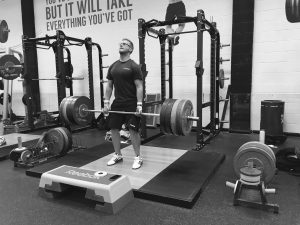
Now, with this in mind I got in touch with a friend of mine, Jordan. He is a sports performance nutritionist for a HUGE (I won't say which one) nutrition company. He's my go-to source of nutrition info when I have a question. Before I made my mind up if I was going to experiment with low calories, I thought I'd run it by him.
Anyway, this is what happened in our recent convo…
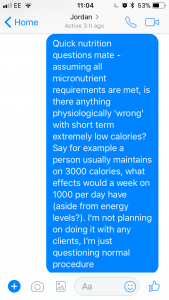
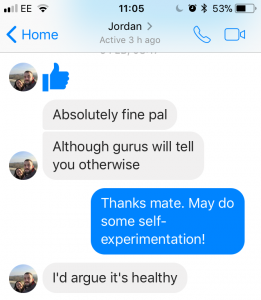
So, there we go. A clinical nutritionist who works with professional athletes says it's OK.
Good start.
Next up, I'd have to decide the approach I'd take. Of course the obvious thing is you just eat less, but that's a little too simplistic. If I'm going to eat little but still perform well, I can't rely on just filling my pie-hole with garbage. I had to be a little more tactical.
I usually eat around 3000 calories per day, so my thinking was to make the experiment a 1000 calorie diet for 5 days. Long enough to see an effect, short enough that the end of the diet was in sight. In reality 5 days doesn't take a huge amount of discipline, so I opted for that.
I decided to start with accepted good practice, which dictates that if you are going to eat very low calories, it's a good idea to over-compensate with high micronutrient intake. I always take a multivitamin anyway, but in this case I decided to go for an extra powerful multivitamin.
Next up was the omega issue. I'm allergic to fish, so I can't eat it. I do see the value in an omega supplement though, so I look this one….
Finally, I wanted to take a greens drink that doubled as two things… a breakfast drink and an extra dose of multivitamins and minerals. I like both Athletic Greens and Lean Greens, but opted for Lean Greens on account of price alone.
So that's my vitamins and minerals sorted. You may argue it's overkill and in reality, it probably was. Still, I saw it as insurance, following good practice and a case of better being safe than sorry. It worked too, as we'll go into later in the article.
The 1000 Calorie Diet Strategy
I think it's important to have a plan when you go into anything like this – it's such a dramatic change in practice that it can be really, really difficult if you don't have a strategy before you head into it.
I had to balance two main issues…
- Give myself enough energy to train and recover well.
- Eat only enough to hit close to 1000 calories, but try to avoid hunger.
I wasn't counting my macros, but I was counting my calories. I did that using My Fitness Pal and by checking the labels on food.
Given it was only ever going to be a short-term experiment (5 days), I was happy to occasionally go with decent quality ready meal options such as soups etc, mostly because it took the work out of counting the calories for me. I'm a sucker for the convenience, so that won out in the end!
On a normal week I'll train around 5 times and according to my heart rate monitor, I'll burn anywhere between 500 and 1000 calories per workout, depending on the session. I was willing to accept that and still only eat 1000 calories, given part of the nature of this experiment was the extremity of it all.
I needed fuel to train and recover, so decided to base my meal strategy around my exercise – essentially splitting my food intake across two meals, a small one before training and the larger one afterwards. Physiologically and socially, this approached really worked for me during the experiment. Here's why….
- I don't really eat breakfast. I've never been a big breakfast fan, unless I'm on holiday and can relax into it. Usually I'm up early, we've got kids to feed/wash/dress/transport and I start work early. Breakfast is an afterthought in at least 80% of cases, which meant eating only two meals was easy. I was having a greens drink in the morning, so 'breakfast' was covered.
- I can't train very well on a full stomach. I like to eatsome food before training, but not a huge amount. Basically I want enough to get me through a workout and not much else. My training doesn't really require it either.
- Immediately post-training, I'm usually not very hungry. I can leave eating a big meal for good while after exercise. I'll usually have a small snack, but not sit down to a big meal for a good few hours afterwards.
- I like to eat something substantial in the evening, so saving more of my calories for the end of the day works for me. It's also when Rach and I eat our biggest meal, so it made life socially easier.
My general meal guideline was that it needed to contain protein, but also had to be generally healthy because that gave me more volume of food per calorie, something that I later learnt to be key in the success of all of this.
What happened when I ate a 1000 calorie diet….
Day 1 on a 1000 Calorie Diet
The first day was easy – I was already fuelled from the day before, plus I hadn't 'endured' a few days of low calories, so in reality it felt like a single day of eating only 1000 calories, which is exactly what it was.
Day 2 on a 1000 Calorie Diet
At this point I had to think a little more. I was hungrier, but it wasn't too bad. I learnt that if you keep plenty of water handy, you can get away with a little more distance between meals.
Day 3 on a 1000 Calorie Diet
I wasn't especially hungry, but I was giving my food choice a LOT more thought. It made my eating far more conscious. When I was picking my early meal it was based purely on volume – which choice would give me the largest volume of food for the lowest number of calories.
Day 4 on a 1000 Calorie Diet
This was when it started to get tougher. I play football on a Thursday, so knew I was going to need some energy. It was by now that I was missing the snacks I'd usually eat throughout the day and it took some serious willpower (despite me thinking it's a myth) to not eat the snacks.
Day 5 on a 1000 Calorie Diet
The last day was easier again, probably because I'd found a way to make it (kind of) work for me. Also the fact that the end of the experiment was in sight made it psychologically easier too. My weight loss was quite apparent by this point.
The Results of the 1000 Calorie Diet Experiment
There are three ways to look at the results of a 1000 calorie diet…
- Weight loss effects
- Performance effects
- Behavioural effects
Each of them are valid in their own right and are relevant depending on the lens through which you assess the virtues of a nutritional plan.
I didn't have a bias beforehand – I was simply doing it as an experiment to test accepted wisdom. Thanks to this, I feel like I can offered a balanced opinion on the three effects I experienced.
Weight loss on a 1000 calorie diet
I started the week weighing 94.5kg and I ended it weighing 90.7kg, so I dropped 3.8kg, or just over 8lbs in old money.
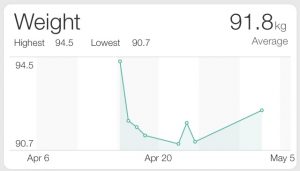
It's important to point out that this wouldn't all have been fat, it would mostly be water weight. My motivation wasn't weight loss, as I've said before. It's an interesting outcome, but anyone using the approach to simply lose weight would probably be better off with a slower, more long-term approach which would see more fat lost.
Once I reverted to my normal eating, I regained some weight, but only around 1kg. With that in mind it's probably appropriate to recommend this as a kick-start to weight loss, rather than a long term approach.
I've had a few people ask me how accurate my weight loss was, and I can tell them honestly it's pretty bang on – I used these scales from Archon and have tested them with kettlebells and dumbbells that I know to be accurately weighed and they read the same figure…
Performance effects on a 1000 Calorie Diet
I expected there to be a dramatic effect on performance with the 1000 calorie diet and there was – to a degree.
Most of my training is quite explosive, with the vast majority of my training consisting of weight lifting and it's variations. I do cardio in the form of football (which is very high intensity), but most of the training I do is quite glycolytic (anaerobic or 'without oxygen'). Basically this means the effort is short, but very high intensity.
For this kind of training, I don't need huge sugar/fuel reserves, so I noticed that as long as I hadsome fuel on board, I was fine.
It was much tougher playing football on the 1000 calorie diet as the fuel reserves required are much higher, so that was a real slog! I coped, but I knew that it really wouldn't be a good idea for someone who trains using long duration cardio such as running or cycling.
Behavioural effects of a 1000 Calorie Diet
This is perhaps the most interesting area to me lately. Following on from my recent no sugar experiment, I've become more interested in the behavioural choices we make around food, because essentially it's just a series of decisions we make each time we come to eat.
When following the 1000 calorie diet, I was forced into making different choices. Anyone who is familiar with macronutrients will be aware that when dieting, it is still important to maintain a high protein intake, especially if you are active. With this in mind, I had to ensure my food options were (relatively) high in protein yet low in calories. This isn't easy.
Next up was a volume issue – I had to ensure that I was eating enough to feel as though I actually had something in my stomach. There are tricks to this, such as making sure you drink plenty of water so you stay full etc, but it's still something you have to consider.
Flavour is key too. If you are already eating low calorie, you have to have a least some enjoyment from your food, so I found myself opting for things that at least tasted good! It opened me to a few new options I'd never have really considered before, such as vegetarian curry snack packs – they averaged around 200 calories but contained a lot more food than the meat versions, ticking the volume box!
Uses for a 1000 calorie diet
My initial thoughts are that it's idea for anyone looking to kick start weight loss. Most people wouldn't cope on it for the long term, but as a short term fix it certainly has its uses. I dropped over 8lbs in 5 days using it.
I also think it's a great behaviour change tool. If you respond well to strict rules around your diet, sticking to 1000 calories is a simple but easy enough one to follow. You don't have to count macros or follow meal timing rules, you just eat 1000 calories and try to keep your protein high. A high protein intake is important, whether you go for whole food sources, bars, shakes or even BCAA drinks.
Who shouldn't follow a 1000 calorie diet
If you are a competing athlete with a high training volume, then the 1000 calorie diet isn't for you. It's basically impossible to maintain a high training volume on such a low intake of energy.
Cardio bunnies would also struggle. By nature of their exercise, anyone who is running, cycling or swimming multiple times per week would really struggle with the 1000 calorie diet.

Manipulating the 1000 calorie diet for the long term
I have given this some thought and think manipulating a 1000 calorie diet for long term use is both possible and practical for anyone looking to lose weight or body fat.
The diet would look like a modified 5:2, with the daily base line calories being 1000, from high protein sources. On training days, calories would be spiked relative to the activity and the rate of weight loss, but would revert to the 1000 calories on non-training days.
The diet would have to be individually tailored, but I think that approach would work. I can't think of a reason it wouldn't, but I'll spend more time on my thinking/experimenting around the topic before I use it as a tool or suggestion for personal training clients.
Training and a 1000 calorie diet
When you're trying to sustain yourself on a 1000 calorie diet, you can still train but thetype of training that you do needs to fall in line. If you're expecting to run marathons or cycle for 50 miles on such small amounts of food, you're going to find it impossible.
If you go for lower intensity weight training, like light weight leg pressing, chest pressing etc, you'll cope easily even on the low calories.
What you need to do instead is focus on short, sharp bursts of effort. Weight lifting, weight training and some HIIT protocols will work. The kind of workouts I was doing on my 1000 calorie diet are the ones in my HIIT eBook.
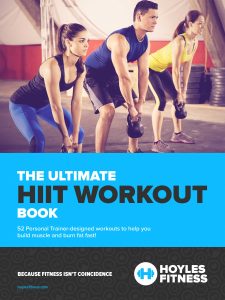
I did some of these workouts on 4 of the 5 days I was eating the 1000 calorie diet and found them to be tough, but I could cope. It's because the nature of the workouts are that they are short, but intense – perfect for when you're only eating 1000 calories per day!
The 1000 calorie diet, final thoughts
The first conclusion to draw regarding the 1000 calorie diet is that yes, it's totally possible to live on 1000 calories. There are performance issues, but if you have weight/body fat to lose, it's very much an approach that can work for you.
I safeguarded by dramatically increasing my micronutrient (vitamin and minerals) intake, so I felt great doing it.
A lot of our behaviour around food is purely habitual, so forcing a dramatic change in your behaviour around food makes you really think about the choices you make.
As a long term dietary approach, it'd need some manipulation in order for it to be a suitable long term option, but I honestly think with a level of self-control and discipline, it's something that could work for most people. As long you ramped-up calories around activity, it's a diet that would prove very effective for many.
UPDATE! In Feb 2020 I did a 3 Day Fast – it's part of the ongoing experimentation in my nutrition. It was a really interesting experiment and I learned so much and experienced things I'd heard about first-hand. I blogged about it here. Take a look, because I've no doubt you'll learn a few things.
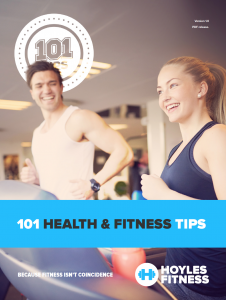
Source: https://www.hoylesfitness.com/weight-loss-and-nutrition/1000-calorie-diet/
0 Response to "Will a 1000 Calorie Diet Work"
Post a Comment